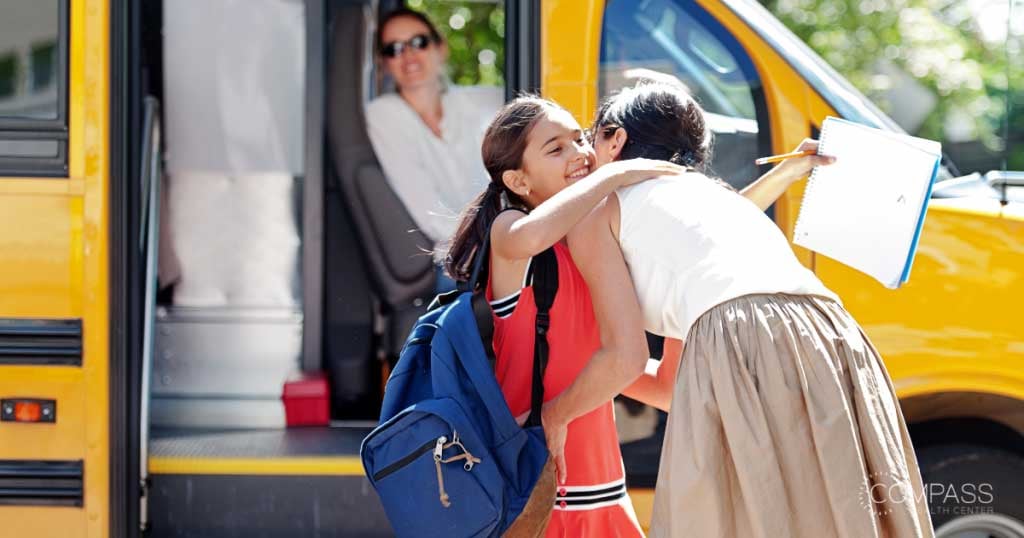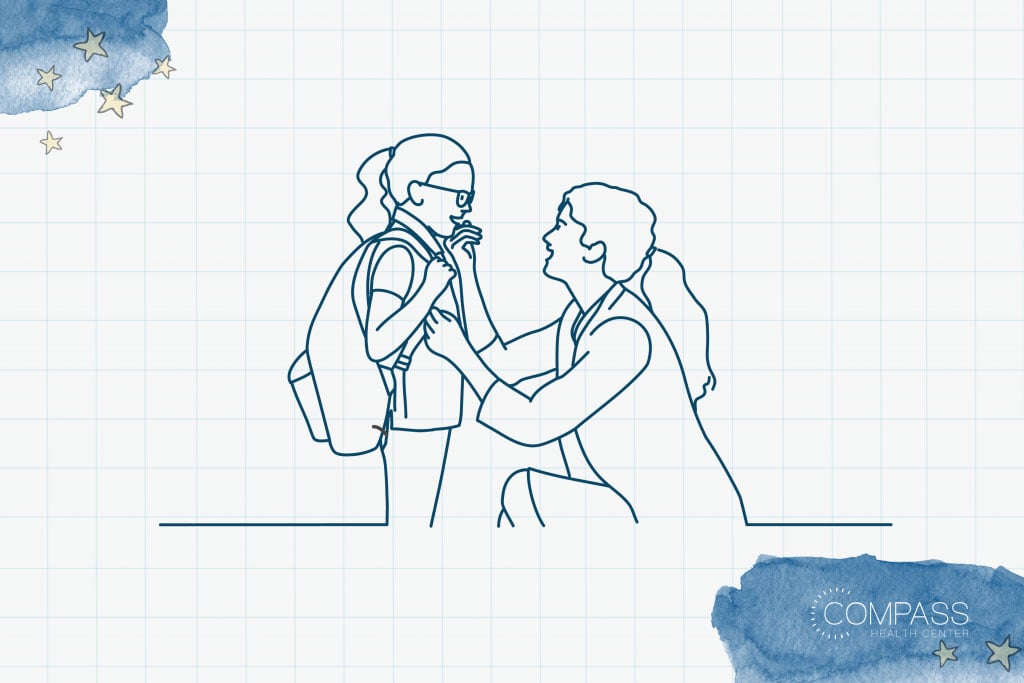As back-to-school time rapidly approaches, it is common to see an increase in anxiety and related acting-out behaviors in children. Transitions are often difficult periods for children and the end of summer signals the end of unstructured and carefree time and the beginning of school, homework, and new routines. Children who struggled at school in previous years may be worried about going through those struggles again. Other children may struggle to tolerate feelings of uncertainty they associate with new teachers, classes, social situations, expectations, curricula, and even school buildings.
Beth Hope, LCSW, Senior Director of Child and Adolescent Programs at Compass Health Center explains, “it is important that parents and caregivers create spaces and opportunities proactively to help children identify and explore what and how they are feeling so that children feel supported, prepared, and empowered to effectively manage emotions and situations when school begins.”

6 Tips to Prepare Your Anxious Child for Back to School:
1. Begin discussions with your child well before the new school year starts.
Acknowledge that a time of transition is approaching. As adults, we often forget that children are not always in tune with their emotions and that they may struggle to connect them with their experiences, thoughts, physical sensations or symptoms and behaviors. Encouraging children to really take the time to think about the emotions they are experiencing and to name them is helpful and they may need help with this process. It is important not to make assumptions about how children are feeling and to avoid “should” statements based on what we think might be reasonable or typical.
2. Problem-solve as a team.
Children should be empowered to play a role in creating or contributing to plans and solutions in a developmentally appropriate way. Finding opportunities to ask them how they think they might want or be able to challenge or manage an emotion or situation will yield better results than telling them what they can or should do in that it increases the likelihood that a child will buy into the solution, will follow through on ideas or plans, and will increase their sense of confidence in achieving these goals.
3. Start school routines early.
Alleviate back-to-school anxiety by re-establishing routines before the school year begins. This allows children and families the time to adjust to the changes in a less abrupt manner and increases the likelihood that things will go more smoothly and successfully. This is especially the case with things like wake-up and bedtimes as well as homework schedules. Co-creating a schedule and expectations for the year as a family, including developmentally appropriate input from children will also help ease anxiety and allows the children a sense of ownership in the plan. Making visual representations of schedules, rules, and any reward or incentive plans creates buy-in and clearly communicates expectations which in turn, can alleviate anxiety associated with uncertainty.
As much as it may seem that children prefer the unstructured summertime, the return of structure and clear expectations and routine often feels reassuring and calming to them. Setting up physical spaces for homework can also be a collaborative and fun way to engage in back-to-school preparations that may decrease worry and generate excitement.
4. Prepare a checklist and reward chart.
Anxiety is frequently brought on by a child not knowing what to expect. Creating a checklist with all the daily activities associated with school helps to bridge that gap between what is coming and what is unknown. Additionally, having a reward chart initiates motivation and gives your child something to look forward to during what is viewed as a challenging time.
5. Coordinate social activities with school friends.
Give your child an opportunity to connect or reconnect with kids from their class. Having familiar and friendly faces nearby will comfort them. Fostering friendships can be one of the most helpful tools in preparing your child for school.
6. Seek help when needed.
Sometimes, anxiety symptoms become more prevalent and severe. If new behaviors are seen, or ongoing behaviors begin to disrupt regular daily functioning, you may consider having your child evaluated by a mental health expert. Experienced mental health practitioners will provide the help and guidance needed to move forward with the upcoming school year.
Getting Ready for School With Compass Health Center
Following the tips above is an effective way to approach the upcoming school year. Listening to your child and validating their feelings will create an environment where they feel protected and safe. Feeling supported and acknowledged goes an exceptionally long way.
Preparing your anxious child for the upcoming school year can be made much simpler by following some or all the tips above. The stress and anxiety that children feel when the new school year is starting are common, however, when outside help is needed, the experienced team at Compass Health Center is available for support and treatment. Enjoy the rest of summer and the start of the new successful school year. 






